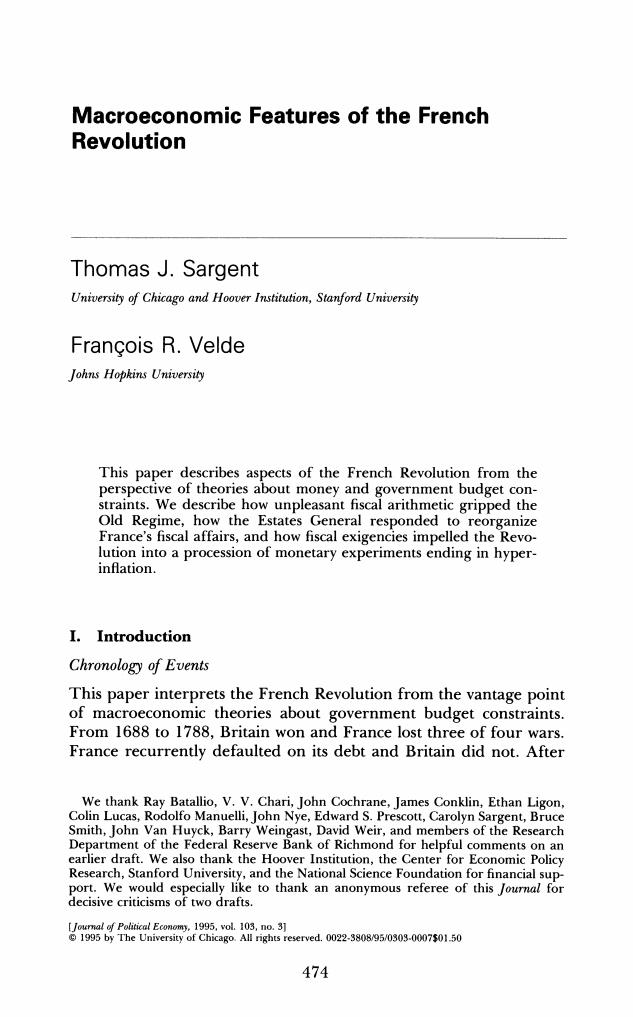正在加载图片...

Macroeconomic Features of the French Revolution Thomas J.Sargent University of Chicago and Hoover Institution,Stanford University Francois R.Velde Johns Hopkins University This paper describes aspects of the French Revolution from the perspective of theories about money and government budget con- straints.We describe how unpleasant fiscal arithmetic gripped the Old Regime,how the Estates General responded to reorganize France's fiscal affairs,and how fiscal exigencies impelled the Revo- lution into a procession of monetary experiments ending in hyper- inflation. I.Introduction Chronology of Events This paper interprets the French Revolution from the vantage point of macroeconomic theories about government budget constraints. From 1688 to 1788,Britain won and France lost three of four wars. France recurrently defaulted on its debt and Britain did not.After We thank Ray Batallio,V.V.Chari,John Cochrane,James Conklin,Ethan Ligon, Colin Lucas,Rodolfo Manuelli,John Nye,Edward S.Prescott,Carolyn Sargent,Bruce Smith,John Van Huyck,Barry Weingast,David Weir,and members of the Research Department of the Federal Reserve Bank of Richmond for helpful comments on an earlier draft.We also thank the Hoover Institution,the Center for Economic Policy Research,Stanford University,and the National Science Foundation for financial sup- port.We would especially like to thank an anonymous referee of this Journal for decisive criticisms of two drafts. [Joural of Political Economy,1995.vol.103,no.3] 1995 by The University of Chicago.All rights reserved.0022-3808/95/0303-0007$01.50 474Macroeconomic Features of the French Revolution Thomas J. Sargent University of Chicago and Hoover Institution, Stanford University Frangois R. Velde Johns Hopkins University This paper describes aspects of the French Revolution from the perspective of theories about money and government budget constraints. We describe how unpleasant fiscal arithmetic gripped the Old Regime, how the Estates General responded to reorganize France's fiscal affairs, and how fiscal exigencies impelled the Revolution into a procession of monetary experiments ending in hyperinflation. I. Introduction Chronology of Events This paper interprets the French Revolution from the vantage point of macroeconomic theories about government budget constraints. From 1688 to 1788, Britain won and France lost three of four wars. France recurrently defaulted on its debt and Britain did not. After We thank Ray Batallio, V. V. Chari, John Cochrane, James Conklin, Ethan Ligon, Colin Lucas, Rodolfo Manuelli, John Nye, Edward S. Prescott, Carolyn Sargent, Bruce Smith, John Van Huyck, Barry Weingast, David Weir, and members of the Research Department of the Federal Reserve Bank of Richmond for helpful comments on an earlier draft. We also thank the Hoover Institution, the Center for Economic Policy Research, Stanford University, and the National Science Foundation for financial support. We would especially like to thank an anonymous referee of this Journal for decisive criticisms of two drafts. [Journal of Political Economy, 1995, vol. 103, no. 3] ? 1995 by The University of Chicago. All rights reserved. 0022-3808/95/0303-0007$01.50 474